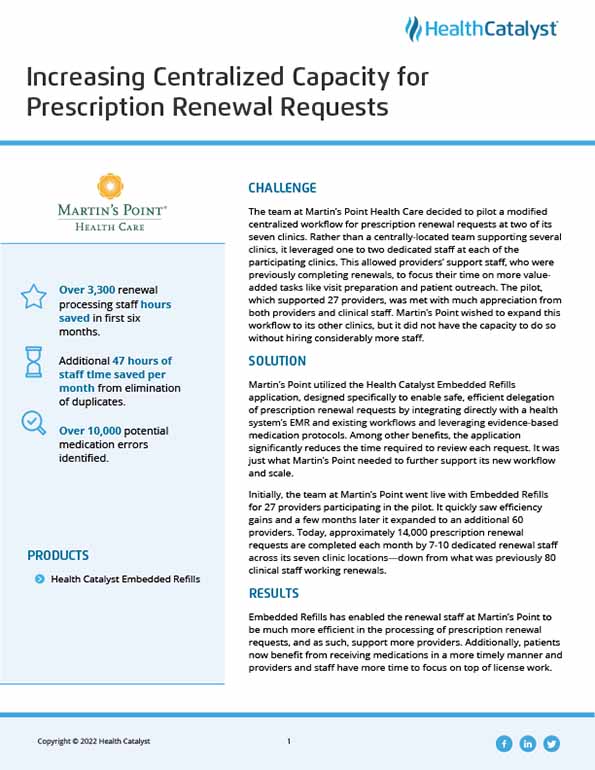Martin’s Point Health Care desired to expand its centralized workflow for prescription renewal requests, but it could not do so without hiring additional staff. The organization utilized the Health Catalyst Embedded Refills application to process prescription renewal requests more safely and effectively, decreasing turnaround time and improving patient safety.
The team at Martin’s Point Health Care decided to pilot a modified centralized workflow for prescription renewal requests at two of its seven clinics. Rather than a centrally located team supporting several clinics, it leveraged one to two dedicated staff at each of the participating clinics. This allowed providers’ support staff, who were previously completing renewals, to focus their time on more value-added tasks like visit preparation and patient outreach. The pilot, which supported 27 providers, was met with much appreciation from both providers and clinical staff. Martin’s Point wished to expand this workflow to its other clinics, but it did not have the capacity to do so without hiring considerably more staff.
Martin’s Point utilized the Health Catalyst Embedded Refills application, designed specifically to enable safe, efficient delegation of prescription renewal requests by integrating directly with a health system’s EMR and existing workflows and leveraging evidence-based medication protocols. Among other benefits, the application significantly reduces the time required to review each request. It was just what Martin’s Point needed to further support its new workflow and scale.
Initially, the team at Martin’s Point went live with Embedded Refills for 27 providers participating in the pilot. It quickly saw efficiency gains and a few months later it expanded to an additional 60 providers. Today, approximately 14,000 prescription renewal requests are completed each month by 7-10 dedicated renewal staff across its seven clinic locations—down from what was previously 80 clinical staff working renewals.
Embedded Refills has enabled the renewal staff at Martin’s Point to be much more efficient in the processing of prescription renewal requests, and as such, support more providers. Additionally, patients now benefit from receiving medications in a more timely manner and providers and staff have more time to focus on top of license work. Specifically, it has seen significant improvements in processing time, a reduction in duplicate requests and enhanced patient safety.
Prior to utilizing Embedded Refills, Kimberly Fallona, Sr. Project Manager at Martin’s Point, estimates each renewal request was taking approximately five minutes to complete. After implementing the application, that time dropped to just a minute and a half. “Based on our before and after processing times, we estimate having saved over 3,300 staff hours in just the first half of the year,” says Fallona.
Duplicate renewal requests were also a common occurrence. Often, duplicates are a result of slow turnaround times, as pharmacy systems automatically resend requests when they haven’t received a response in 24-48 hours. Since staff at Martin’s Point is now able to complete renewals faster, the turnaround time has decreased, leading to fewer duplicates.
Prior to utilizing Embedded Refills, duplicates for the original pilot providers accounted for roughly 10 percent of all renewals. After implementing the application and decreasing turnaround time, that rate dropped to 6.5 percent. Remaining duplicates are automatically flagged as such so that staff can simply ignore them and focus solely on the original prescription request. This combination of reduced duplicate rate and elimination of potential time spent on duplicates equates to approximately 47 hours of staff time saved each month.
Perhaps one of the biggest benefits of implementing Embedded Refills has been the impact on patient safety. Because the application cross-references each renewal request with a patient’s active medication list, it can also call out potential medication errors. For example, in the last eight months, Martin’s Point received over 10,000 requests for medications that had either been discontinued or had a dosage change since the patient’s last visit. Fallona notes, “Patient safety and trust are critical at all stages of healthcare. Embedded Refills ensure our quality and commitment to patients is met, even when they’re doing something as simple as requesting a prescription refill.”


